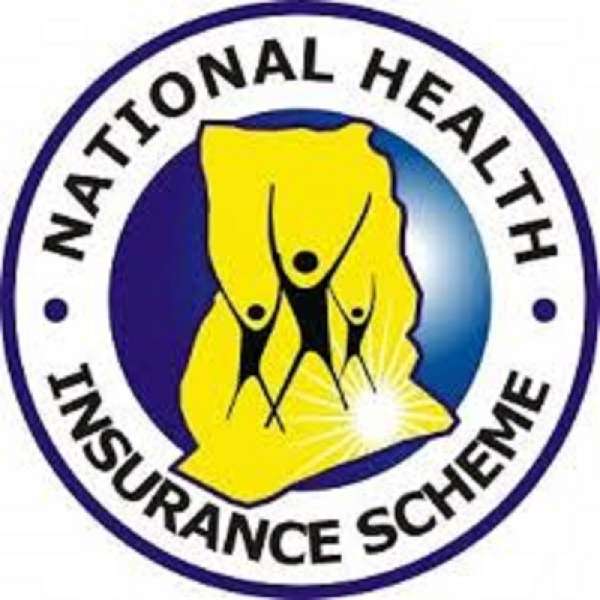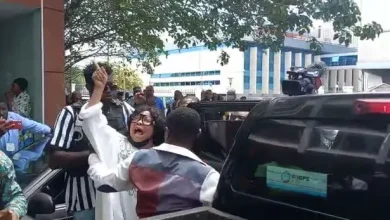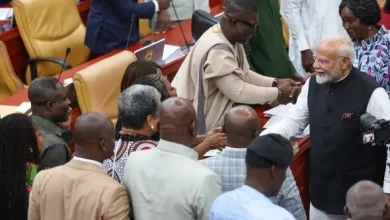
Private
Health Facilities in Ghana (PHFAoG) has threatened to withdraw their services if
the National Health Insurance Authority (NHIA) does not pay their ten (10)
months claims in arrears by 16th of
December, 2019 to alleviate the intensity of their woes and distress
The association said the delay in payments has put some
service providers in court for defaulting in paying their suppliers, bank loans
and draft, honoring tax obligations to the Ghana Revenue Authority (GRA) and
non-payments of Social Security and National Insurance Trust (SSNIT)
contributions
The association, consisting of pharmaceutical company and
outlets, hospitals, clinics, maternity homes, investigation and images
companies in Ghana, said the inability of the NHIS for a longer period is
collapsing their businesses.
In a release issued on November 11, 2019, and copied to
otecfmghana.com, the Mr Samuel Boakye Donkor, Acting President PHFAoG “urged
Government, Ministry of Health, the NHIA, Parliamentary Select Committee on
Health and stakeholders to treat this issue with the utmost urgency it deserves
to pre-empt any imminent action from service providers.”
Mr. Boakye Donkor, said
the NHIA has breached its contractual agreement that mandates the NHIA to make
payments within ninety (90) days of receipt of a claim.
“The most recent payment received by health service providers
under the scheme was for the month of February 2019, leaving a huge debt of
between nine (9) to ten (10) months, contrary to reports by the NHIA of having
paid of a bigger chunk leaving a debt gap of five (5) months,” the release
added.
“We are therefore by this release demanding the payments of
all arrears from February 2019 to December
2019, as well as arrears of over twelve
(12) months in some cases and with immediate effect, unrealistic tariffs on the
operational price list should be reviewed,” the association demanded.
‘’We have particularly resonated this subject countlessly with the hope of a permanent redress. Most recent reimbursement covered the month of February, 2019 and even that, about only 30% of the facilities have received payment leaving a huge unsettled gap of nine (9) to ten (10) months which is a flagrant contravention of the National Health Insurance ACT 852 and the L.I 1809 sections 37 and 38 respectively. Private facilities are overburdened with debt from suppliers, banks (loans and overdrafts), inability to settle mandatory payments to GRA and SSNIT. Prosecutions and constant harassments have become a disincentive to operate’’ PHFAoG said.
‘’Technically, service providers have not benefited from an upward review since 2015. The consequent removal of the 17.5% VAT on imported medicines led to a 30% price cut on medicine tariffs sanctioned by the NHIA and effected on the 1st of July, 2018. This move by the government was miscalculated and woefully failed to provide the intended effect. The situation is exacerbated with the 45% to 70% price increase by wholesalers/suppliers, far beyond the Scheme’s approved prices’’ the release indicated.
‘’With these revelations in sight, we are initiating a full scale “CASH AND CARRY” on the 16th of December, 2019 if payments outstanding from 2018 to some of our members and that of 2019 is not cleared to alleviate the intensity of our woes and distress. We know this action will most likely spark an unnecessary uproar and erode confidence in policy execution by government but we have no option’’.
Read the full statement below
This is the statement below
Quality health care delivery reverberates the socio-economic policies of every government and for this reason, private health facilities in Ghana have consistently played a pivotal role in the achievement of the Sustainable Development Goal 3 through the provision of accessibility and coverage health care services irrespective of social status, gender, ethnicity and race which transcends geographical barriers to the good people of Ghana hence, our imperative contribution should not be undermined.
Majority of private health facilities in Ghana are accredited to the National Health Insurance Scheme which is a historical intervention intended to provide relief and improve the health needs of all Ghanaians especially the under privileged. We the private health facilities have been a very strong and committed partner in ensuring the intents and purposes for which the scheme was established and have done that unflinchingly over the years.
Recent developments clearly outlined below threaten the achievements and integrity of the relationship between the National Health Insurance Accredited facilities on one hand and the Scheme on another which requires prompt attention.
DELAY IN REIMBURSING: We have particularly resonated this subject countlessly with the hope of a permanent redress. Most recent reimbursement covered the month of February, 2019 and even that, about only 30% of the facilities have received payment leaving a huge unsettled gap of nine (9) to ten (10) months which is a flagrant contravention of the National Health Insurance ACT 852 and the L.I 1809 sections 37 and 38 respectively. Private facilities are overburdened with debt from suppliers, banks (loans and overdrafts), inability to settle mandatory payments to GRA and SSNIT. Prosecutions and constant harassments have become a disincentive to operate.
Unequivocally stated in the contract agreement: “The NHIA will make payments within ninety (90) days of receipt of a claim unless written notice of a dispute or discrepancy is furnished the provider within thirty (30) days of the claim”. We would appreciate strict adherence.
REVIEW OF MEDICINE TARIFF: Technically, service providers have not benefited from an upward review since 2015. The consequent removal of the 17.5% VAT on imported medicines led to a 30% price cut on medicine tariffs sanctioned by the NHIA and effected on the 1st of July, 2018. This move by the government was miscalculated and woefully failed to provide the intended effect. The situation is exacerbated with the 45% to 70% price increase by wholesalers/suppliers, far beyond the Scheme’s approved prices.
A few illustrations will clarify the point:
Tab. Amoxicillin + Clavulanic Acid (625mg) is wholesaled at GH21.00, the NHIS pays GH13.02
Tab.Artemether +Lumefantrine 20/120 is wholesaled at GH4.80, the NHIS pays GH2.38
Salbutamol Inhaler is wholesaled at GH23.00, the NHIS pays GH12.60
Heavy losses are incurred which defeats operational efficiency.
Reference to the National Health Insurance ACT 852 sections 34,36,37 and 101 suggests an annual price review to reflect current and realistic market pricing of medicines.
With these revelations in sight, we are initiating a full scale “CASH AND CARRY” on the 16th of December, 2019 if payments outstanding from 2018 to some of our members and that of 2019 is not cleared to alleviate the intensity of our woes and distress. We know this action will most likely spark an unnecessary uproar and erode confidence in policy execution by government but we have no option.
We humbly call on the Government to swiftly intervene to avert the possible effects of these disturbing matters.
In all sincerity, we hope to receive the quickest response.
Mr Samuel Boakye Donkor
Acting President (PHFAoG)
Source: Ghana/otecfmghana.com




